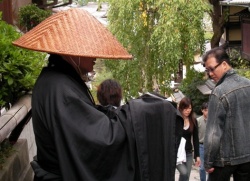Difference between revisions of "Culla Dhammapāla"
| Line 6: | Line 6: | ||
[[Culla-Dhammapāla Jātaka]] (No.358) | [[Culla-Dhammapāla Jātaka]] (No.358) | ||
| − | Once the [[Bodhisatta]] was born as [[Dhammapāla]], son of Mahāpatāpa, [[king]] of [[Benares]] and his [[Wikipedia:Queen consort|queen]], | + | Once the [[Bodhisatta]] was born as [[Dhammapāla]], son of [[Mahāpatāpa]], [[king]] of [[Benares]] and his [[Wikipedia:Queen consort|queen]], [[Candā]]. |
| − | + | One day Candā was playing with her seven-months-old baby with whom she was so engrossed that, when the [[king]] entered the room, she omitted to rise. | |
| − | + | This roused the king's [[jealousy]], and he sent for the executioner and had the prince's hands and feet and head cut off and his [[body]] encircled with sword-cuts " as though with a garland." He paid no heed to [[Candā's]] [[lamentations]], and she, in her great [[sorrow]], fell down [[dead]] of a broken [[heart]]. | |
| − | The story was, told in reference to [[Devadatta's]] attempts to kill the [[Buddha]]. [[Devadatta]] was Mahāpatāpa and [[Mahā Pajāpatī]] was Candā (J.iii.177-82). | + | Flames arose from [[Avīci]], and wrapping [[Mahāpatāpa]] about, "as with a woollen garment," plunged him in the lowest [[hell]]. |
| + | |||
| + | The story was, told in reference to [[Devadatta's]] attempts to kill the [[Buddha]]. [[Devadatta]] was [[Mahāpatāpa]] and [[Mahā Pajāpatī]] was [[Candā]] (J.iii.177-82). | ||
The [[Jātaka]] is often cited (E.g., J.iv.11; v.113) to illustrate how [[anger]], when once arisen, is difficult to control. | The [[Jātaka]] is often cited (E.g., J.iv.11; v.113) to illustrate how [[anger]], when once arisen, is difficult to control. | ||
Latest revision as of 15:43, 13 November 2015
Culla-Dhammapāla Jātaka (No.358)
Once the Bodhisatta was born as Dhammapāla, son of Mahāpatāpa, king of Benares and his queen, Candā.
One day Candā was playing with her seven-months-old baby with whom she was so engrossed that, when the king entered the room, she omitted to rise.
This roused the king's jealousy, and he sent for the executioner and had the prince's hands and feet and head cut off and his body encircled with sword-cuts " as though with a garland." He paid no heed to Candā's lamentations, and she, in her great sorrow, fell down dead of a broken heart.
Flames arose from Avīci, and wrapping Mahāpatāpa about, "as with a woollen garment," plunged him in the lowest hell.
The story was, told in reference to Devadatta's attempts to kill the Buddha. Devadatta was Mahāpatāpa and Mahā Pajāpatī was Candā (J.iii.177-82).
The Jātaka is often cited (E.g., J.iv.11; v.113) to illustrate how anger, when once arisen, is difficult to control.
Source
http://www.palikanon.com/english/pali_names/c/culla_dhammapaala_jat_358.htm
